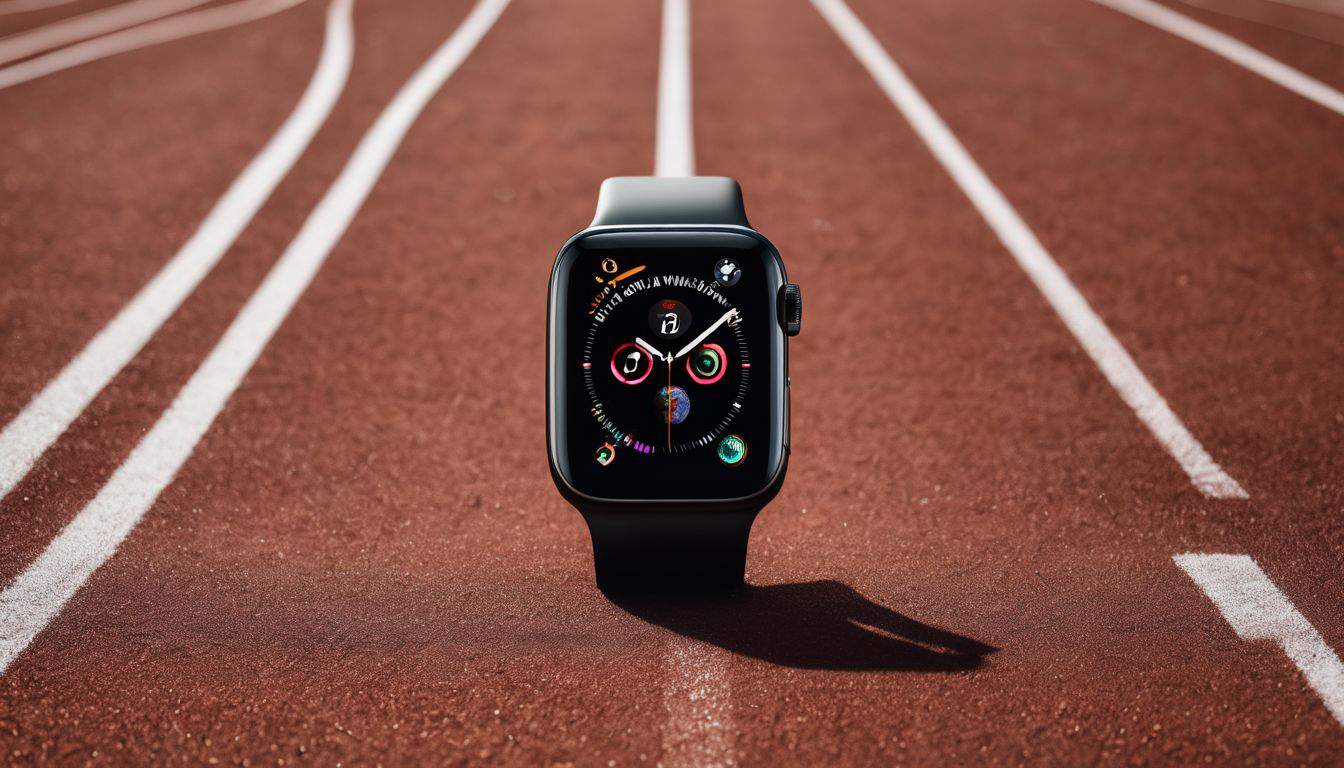Ever found yourself questioning if the Apple Watch is the ideal companion for your running training? Trust me, you’re not alone in this quest. Just like you, I was curious to know if it could whirl up some magic with customizable metrics such as average pace and elevation.
This article aims to decode whether this popular piece of wearable tech truly lives up to its hype as a runner’s buddy. We’re all set to explore real-life reviews, reveal handy tips, and unpack the advanced features that come along with it.
So are we ready to unravel the truth about jogging alongside an Apple Watch? The journey begins now!
Key Takeaways
- The Apple Watch is a great companion for running training due to its performance metrics, customizable workouts and training plans, sleep tracking and cycle tracking capabilities, as well as safety features for outdoor runs.
- Real – life reviews from runners show that many find value in using the Apple Watch for their training needs, though GPS accuracy may not be as advanced as dedicated running watches.
- To get the most out of your Apple Watch for running, update your stats and calibrate the watch for accurate measurements, customize your metrics and goals to align with your training needs, utilize other running apps and features available on the Apple Watch, and analyze your data to track progress and identify areas for improvement.
Why the Apple Watch is a Good Option for Running Training
The Apple Watch is a great choice for running training due to its performance metrics, customizable workouts and training plans, sleep tracking and cycle tracking capabilities, as well as safety features for outdoor runs.
Performance metrics and tracking capabilities
The Apple Watch packs a punch with its performance tracking tools. It keeps score of your workout data. This includes how fast you run, how far you go, and the path you take. GPS tracking gives clear details about your run route.
Your heart rate during the run gets monitored too. The watch even tracks changes in height on your running trail thanks to elevation tracking. You get full info on your running form as well! This helps tweak workouts for better results down the line.
Elevation metrics make hill runs easier to plan and follow through with. Ground contact and stride length are other cool things this watch measures while you’re pounding pavement or trails.
Step-by-step stats like these help push training forward in big ways!
Customizable workouts and training plans
The Apple Watch lets you make your own workouts. You can pick your pace, distance, time, or heart-rate zones. This helps you train the way you want to. The watch truly fits in with any plan you may have for running.
Need to track something specific during runs? No trouble! You can change what data shows on the Apple Watch screen. Want a more accurate record of your run? Just calibrate the watch! It’s that easy and helpful when it comes to meeting goals for your runs.
Personalizing your running journey has never been simpler thanks to these features.
Sleep tracking and cycle tracking for overall health monitoring
The Apple Watch takes good care of my health. I wear it to bed each night. It watches over my sleep and tells me how well I slept. It tracks the length of my sleep, shows when I was still and when I moved about.
During the day, it also checks on other parts of my well-being. The heart rate tracker keeps an eye on how fast or slow my heart beats. This helps a lot during runs! Mood tracking clues me in if there is a change in how I’m feeling throughout the day.
Besides that, for women like myself, the watch has helpful cycle tracking features too! This lets me keep up with important dates and body changes every month.
So you see? With Apple Watch’s sleep checking and cycle tracking, monitoring health gets really easy!
Safety features for added security during outdoor runs
During outdoor runs, safety is essential. That’s why the Apple Watch has built-in features to provide added security. One of these features is fall detection technology. If you take a hard fall while running, the watch can detect it and immediately send an alert to your wrist.
It will also sound an alarm and display an alert on the screen, ensuring that help can be reached quickly if needed. In addition to fall detection, the Apple Watch Series 8 offers new features like body temperature sensing and car crash detection for even more comprehensive monitoring and protection during your runs.
Is Apple Watch Good for Running Training: Real-Life Reviews and Experiences

As a running enthusiast, I wanted to share some real-life reviews and experiences about using the Apple Watch for running training. Many runners have found the Apple Watch to be a valuable tool in their training journey.
It offers features like GPS capabilities, which allow you to track your routes accurately. Plus, it has advanced tracking abilities that can monitor your pace, distance, heart rate, and more during runs.
Users have praised the Apple Watch for its running-focused features, such as customizable workouts and intervals. You can create personalized goals based on your fitness level and training needs.
The watch also syncs with popular run and activity tracking platforms, so you can continue using your preferred system seamlessly.
One important factor to consider is that while the Apple Watch Series 9 has good GPS capabilities, it may not be as advanced as dedicated running watches like Garmin in terms of accuracy.
However, overall feedback from runners suggests that the Apple Watch is a reliable companion for tracking runs and providing useful data to analyze progress over time.
In conclusion,” Is Apple Watch Good for Running Training? Real-Life Reviews and Experiences” show that many runners find value in using this device for their training needs. While there are some limitations compared to dedicated running watches in terms of GPS accuracy, the range of features and tracking capabilities offered by the Apple Watch make it a popular choice among runners looking to improve their performance.
Tips for Getting the Most Out of Your Apple Watch for Running
Update your stats and calibrate the watch for accurate measurements.
Update your stats and calibrate the watch for accurate measurements
To get the most accurate measurements from your Apple Watch during your running training, it’s important to update your stats and calibrate the watch. By doing this, you can ensure that your distance, pace, and calorie measurements are as precise as possible. Here are some tips to help you update and calibrate your Apple Watch:
- Adjust your personal information: Make sure that you have entered correct information about yourself in the Apple Health app, such as height, weight, age, and gender. This will help the watch calculate metrics like calories burned more accurately.
- Fine-tune your step length: You can manually calibrate the watch for better distance accuracy by going for an outdoor run or walk with a known distance. Afterward, you can adjust the step length setting in the Workout app on your watch.
- Customize workout metrics: In the Workout app settings on your iPhone, you can choose which metrics you want to see during your runs. This allows you to tailor the display to show only the data that is most important and relevant to you.
- Optimize GPS performance: For better accuracy with GPS tracking during outdoor runs, make sure that Location Services are enabled for both the Workout app and Maps on your iPhone. Also, try to run in open areas away from tall buildings or dense tree cover for a stronger GPS signal.
- Refine heart rate measurements: To improve heart rate accuracy during workouts, tighten the band of your Apple Watch so that it fits snugly around your wrist. Avoid wearing it too loosely or too tight.
Customize your metrics and goals to align with your training needs
I customize my metrics and goals on my Apple Watch to align with my training needs. Here are some tips to help you get the most out of your Apple Watch for running:
- Personalize your metrics: The Workout app on the Apple Watch allows you to choose which metrics you want to track during your runs. Select the ones that are most important to you, such as pace, distance, heart rate, or calorie burn.
- Adjust your goals: Set specific goals that align with your training objectives. Whether it’s improving your pace, increasing your distance, or reaching a certain heart rate zone, customize your watch to track and measure these goals.
- Modify your alerts: Customize the alerts and notifications on your watch to keep you motivated and informed during your runs. Set reminders for when you need to increase or decrease your pace, stay within a certain heart rate range, or reach a specific distance.
- Tailor workout types: Take advantage of the different workout types available on the Apple Watch. From outdoor runs to interval training and even guided runs, choose the workouts that best match your training routine.
- Adapt activity rings: The activity rings on the Apple Watch can be personalized to suit your fitness level and training goals. Adjust them according to what motivates you – whether it’s closing all rings every day or setting higher targets for yourself.
- Optimize data display: Analyze and fine-tune how data is displayed on your watch screen during workouts. Arrange the metrics in a way that is easy for you to read and understand while running.
Utilize other running apps and features available on the Apple Watch
I love using my Apple Watch for running because it offers so many great features and apps to enhance my training. Here are some tips to help you get the most out of your Apple Watch for running:
- Take advantage of other running apps available on the Apple Watch, such as Nike Run Club or Strava. These apps can provide additional data and insights to help you track your progress and stay motivated.
- Explore the different features on your Apple Watch, like the Workout app, which offers customizable workout options specifically designed for running. You can choose from outdoor or indoor runs, set goals, and even create your own intervals.
- Don’t forget to calibrate your watch. This will ensure that your distance and pace measurements are accurate. You can do this by going for a run or walk outside while wearing your watch, and then updating your stats in the Health app on your iPhone.
- Use the Auto Pause feature on your Apple Watch if you need to stop during a run. This feature automatically pauses tracking when you come to a halt, so you don’t have to worry about manually pausing and restarting.
- Take advantage of the coaching features on your Apple Watch. The Focus for Fitness feature provides personalized coaching during workouts, giving you tips and motivation along the way.
- Pay attention to the metrics tracked by your Apple Watch during runs, such as pace, distance, and heart rate. Analyzing this data can help you track your progress over time and identify areas where you can improve.
- If you like mapping out your running routes, use the route tracking feature on your Apple Watch. This allows you to plan and save routes directly on your watch, so you can easily follow them during your runs.
Analyze your data to track progress and identify areas for improvement
As a running enthusiast, I know how important it is to track my progress and find areas where I can improve. That’s why I love using my Apple Watch for running training. Here are some tips to help you analyze your data and get the most out of your workouts:
- Use technology to monitor your running workouts: The Apple Watch provides accurate data on metrics like pace, distance, and heart rate. This information can help you see how you’re progressing over time.
- Track your progress with data analysis: Take advantage of the Apple Watch’s ability to store and analyze your running data. By reviewing your past workouts, you can identify patterns, set goals, and track your improvements.
- Identify areas for running improvement through data tracking: Pay attention to areas where you need to improve, such as pace consistency or endurance. By analyzing your data, you can focus on these specific areas in your training.
- Utilize data analysis to improve your running performance: Once you’ve identified areas for improvement, create a plan based on the insights from your data. Adjust your training routine, set achievable goals, and measure your progress over time.
- Monitor your running progress and identify areas for growth: Regularly review your data to see how far you’ve come and where there’s room for growth. Celebrate achievements and adjust strategies as needed.
Understanding Advanced Running Metrics on the Apple Watch
Discover how the Apple Watch’s heart rate zones, running power, and pace tracking can take your training to the next level. Read more about these advanced metrics here!
Heart rate zones and training based on running power
When it comes to running training, understanding your heart rate zones and utilizing running power can greatly enhance your performance. The Apple Watch provides valuable metrics for measuring these aspects of your training.
With the Heart Rate Reserve method, the watch automatically creates 5 heart rate zones tailored to your fitness level. These zones help you optimize your training by ensuring you’re working at the right intensity for different types of runs.
Additionally, the Apple Watch tracks running power, which gives insight into your overall running efficiency and effort. By combining heart rate zone training with running power monitoring, you can take a more holistic approach to improving your performance and reaching your goals.
Use of pace, distance, and elevation tracking during runs
During my runs, I find it really helpful to use the pace, distance, and elevation tracking features on my Apple Watch. It gives me valuable information about how I’m doing and helps me monitor my progress. Here are some key points about these tracking features:
- Pace Tracking: The Apple Watch accurately measures your pace in real-time, so you can see how fast or slow you’re running. This allows you to adjust your speed and keep a consistent pace throughout your run.
- Distance Tracking: With GPS technology, the Apple Watch calculates the distance covered during your run. It’s great for keeping track of how far you’ve gone and helps with setting goals for longer distances.
- Elevation Tracking: If you’re running on hilly terrain, elevation tracking is a handy feature to have. The Apple Watch records the changes in elevation during your run, giving you an idea of the inclines and declines you’ve encountered.
Utilizing the pacer feature for goal-oriented training
The Apple Watch has a useful feature called the pacer that can help you with goal-oriented training. With this feature, you can input the distance and time you want to achieve, and it will tell you the ideal pace you should maintain during your run.
This helps in keeping a consistent pace throughout your workout, which can lead to improved performance and increased endurance. The pacer feature is great for setting goals and pushing yourself to reach them while maintaining a steady rhythm.
It’s just one of many tools available on the Apple Watch to enhance your running training experience.
Take Advantage of Training and Workout Building Features
Utilize the Apple Watch’s training and workout building features to customize your running workouts, create intervals for interval training, and track your progress towards your fitness goals.
Creating custom workouts and intervals
I love creating custom workouts and intervals on my Apple Watch. It’s really easy to personalize my workouts and adjust the goals to match what I want to achieve. I can even incorporate warm-up and cool-down times to make sure I have a complete workout session. The best part is that I can program interval training for outdoor running or hiking, which adds variety and keeps me motivated. With all these options, it’s really fun to track my progress towards my goals and manage my workouts effectively. Plus, I can sync my workouts with platforms like Training Peaks for an even better experience.
Multisport workouts for cross-training purposes
I love using multisport workouts for cross-training because they help me improve my athletic performance, strength, speed, and agility. They also help prevent injuries. The Apple Watch allows me to customize my workout views for different sports, which enhances my personalized training experience. It even notifies me when I’ve completed a goal during a multisport workout. Other fitness trackers like the Fitbit Charge 4 and Garmin Vivosmart 4 are also suitable for multisport athletes.
Using the action button for quick access to important features
The Apple Watch Ultra has an action button that makes it easy to access important features for your training and workouts. With just a press of the button, you can quickly set and start your workouts on the watch.
It’s super convenient! The action button also allows you to open specific apps, like the Workout app in Running mode, so you can get right into your run without any hassle. And once you’re in the app, you can use the action button to perform actions like starting a workout or customizing your settings to meet your individual needs.
It’s all about making things more efficient and tailored to you.
Maximize Battery Life for Longer Runs
To maximize battery life during longer runs, consider adjusting the brightness and screen timeout settings on your Apple Watch.
Tips for conserving battery power during extended runs
When you’re going on long runs with your Apple Watch, it’s important to conserve battery power so that it lasts throughout your workout. Here are some tips to help you maximize battery life:
- Enable Workout Power Saving Mode: This feature disables the always-on display, limits cellular and Wi-Fi connections, and disables background functions, helping to conserve battery power during your run.
- Disable the built-in heart rate monitor: If you don’t need continuous heart rate monitoring during your run, turning off this feature can help save battery life.
- Update the software on your Apple Watch: Keeping your watch’s software up to date can optimize battery performance, ensuring that it runs efficiently during longer workouts.
- Adjust the screen brightness: Lowering the brightness of your Apple Watch’s screen can be an effective way to save battery power while still being able to view your metrics and data.
- Disable the Optimized Charge Limit feature: This feature is designed to help protect the battery health over time but may limit charging when you need maximum duration for a long run.
Battery-saving features and settings to optimize performance
As a running enthusiast, you may be wondering how to maximize the battery life of your Apple Watch during your training sessions. Here are some battery-saving features and settings to help you optimize performance:
- Use Low Power Mode: This mode reduces power consumption by disabling certain features like GPS and heart rate monitoring. It’s perfect for longer runs when you don’t need real-time tracking.
- Adjust Workout Settings: Open the Settings app on your Apple Watch and explore the workout settings. You can customize metrics, turn off unnecessary features, and save battery power during walking or running workouts.
- Reduce Screen Brightness: Lowering the brightness of your Apple Watch screen can significantly prolong battery life. Just swipe up from the bottom of the screen and adjust the brightness slider to your preference.
- Disable Background App Refresh: By turning off background app refresh for non-essential apps, you can conserve energy and prolong battery endurance.
- Optimize Notifications: Minimize the number of unnecessary notifications that appear on your Apple Watch during runs. This helps reduce distractions and saves valuable battery power.
- Enable Power Reserve Mode: If your Apple Watch is running low on battery, activating Power Reserve Mode will conserve energy by disabling most features except basic timekeeping.
- Take Advantage of Battery-Saving Accessories: There are various third-party accessories available that can help extend the battery life of your Apple Watch while you’re on-the-go.
Evaluate GPS Accuracy and Performance of the Apple Watch
The GPS accuracy of the Apple Watch in various environments will be reviewed, highlighting the benefits and limitations of GPS tracking for running.
Review of the Apple Watch’s GPS accuracy in various environments
As a running enthusiast, I know how important accurate GPS tracking is for monitoring and improving my performance. So, when it comes to the Apple Watch’s GPS accuracy in various environments, here’s what I’ve found.
The Apple Watch Series 9 has good GPS accuracy overall, but it’s not as precise as some Garmin watches. However, it’s still on par with other mid-range options available. If you’re looking for even better accuracy in challenging environments like heavily wooded areas or tall buildings, consider the Apple Watch Ultra with its multiband GPS technology.
And from what I’ve heard, the newly released Apple Watch Series 7 has improved GPS accuracy compared to previous models. So, keep these factors in mind when choosing an Apple Watch for your running training needs.
Benefits and limitations of GPS tracking for running
GPS tracking for running offers several benefits. Firstly, it helps accurately calculate your pace and distance, which is crucial for effective training. Secondly, GPS technology allows you to track your outdoor runs and map your routes, enhancing your overall running experience.
Additionally, GPS tracking provides elevation data, giving you insights into the difficulty of your runs and helping you adjust your training accordingly. However, it’s important to note that GPS accuracy can vary depending on environmental factors such as tall buildings or dense forests.
Therefore, while GPS tracking is a valuable tool for runners, it’s worth considering its limitations in certain conditions.
Comparing the Apple Watch Series 8 and Apple Ultra for Running
When comparing the Apple Watch Series 8 and Apple Ultra for running, it is important to consider their features and differences to determine which one suits your training needs best.
Features and differences between the two models
Understanding the differences between the Apple Watch Ultra and the Series 8 can help you decide which one is the more suitable for your running training. Below is a quick comparison to help distinguish between the two.
| Feature | Apple Watch Ultra | Apple Watch Series 8 |
|---|---|---|
| Price | $799 | Varies based on model and features |
| Size | Larger 49mm size | Available in 41mm and 45mm sizes |
| Health Sensors | Similar functionality and health sensors as Series 8 | Similar functionality and health sensors as Ultra |
| Battery Life | Longer battery life | Standard battery life |
| Digital Crown | Larger digital crown | Standard size digital crown |
| Additional Features | Includes new temperature sensors, high-g accelerometer, improved gyroscope for crash detection | Includes standard features |
| Activity Tracking | Can track activity and workouts, provides gentle reminders and friendly competitions | Can track activity and workouts, does not include reminders or competitions |
As you can see, both watches have great features for running training. However, the Ultra model has some additional enhancements that might be worth considering if you’re looking for extended battery life, a larger digital crown, and more advanced sensors.
Pros and cons of each watch for running training
Now let’s weigh the pros and cons of using both the Apple Watch Series 8 and Apple Ultra for running training. These considerations are meant to provide you a comprehensive understanding of what each watch brings to the table.
| Apple Watch Series 8 | Apple Watch Ultra | |
|---|---|---|
| Pros | The Apple Watch Series 8 offers specific updates tailored for runners, making it a solid option if you’re focused on running training. It provides metrics for an outdoor run workout, which includes current heart rate, rolling mile, average pace, and distance. | The Apple Ultra Watch is designed with unique features like upgraded GPS, HR and sleep tracking, and even different types of bands. Its larger size makes it easier to view multiple metrics simultaneously, particularly useful while using the Apple Fitness Run workout app. Not only can it track various types of workouts, but it also possesses the ability to autodetect activities like walking. |
| Cons | While the Apple Watch Series 8 has runner-specific updates, it might not cater to the needs of those who participate in multisport workouts. | Despite the Apple Ultra Watch’s advanced features, its larger size might be a drawback for some runners who prefer a more lightweight and compact design. It may also pose some difficulty in accuracy while tracking in varied environments. |
While both watches have their strengths, it ultimately comes down to your specific training needs and personal preferences. Regardless of your choice, either watch can help enhance your running training experience.
Conclusion: Is the Apple Watch a Good Choice for Running Training?
In conclusion, the Apple Watch is a great choice for running training. Its customizable metrics, advanced features, and training capabilities make it a valuable tool for improving your performance.
Whether you’re a beginner or an experienced runner, the Apple Watch can help you track your progress, set goals, and stay motivated throughout your training journey. So lace up your shoes and let the Apple Watch be your partner in achieving your running success!
FAQs on Is Apple Watch Good For Running Training
1. Can I use an Apple Watch for running training?
Yes, an Apple Watch can be used for running training as it provides features such as GPS tracking, heart rate monitoring, and workout metrics to help you track your progress.
2. How accurate is the GPS tracking on Apple Watch for running?
The GPS tracking on Apple Watch is generally accurate for measuring distance and pace during a run. However, it’s important to ensure that the watch has clear line of sight to satellites for more precise results.
3. Can I listen to music while using the Apple Watch for running?
Yes, you can listen to music from your Apple Music or synced playlists directly through your Apple Watch using Bluetooth headphones during your running sessions.
4. What are some tips for successful running training with an Apple Watch?
Some tips for successful running training with an Apple Watch include setting relevant goals, utilizing personalized coaching features like activity rings and notifications, and analyzing workout data afterwards to make improvements.
5. Is an Apple Watch suitable for beginners who are new to running?
Yes, an Apple watch can be beneficial even for beginners who are new to running as it provides guidance in setting manageable goals and tracks progress over time, helping individuals stay motivated and gradually improve their fitness level.





Leave a Reply